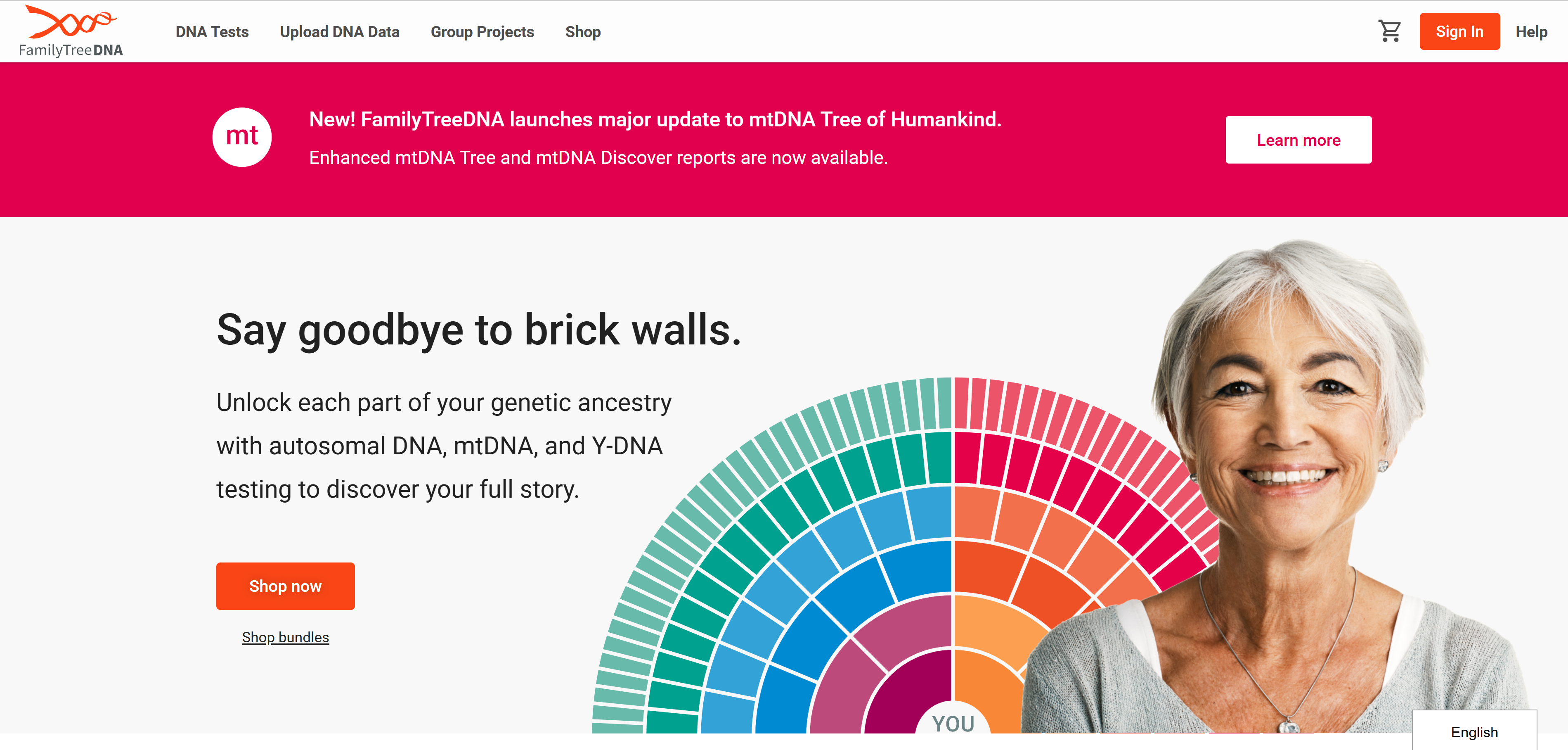FamilyTreeDNA Review: An In-Depth Analysis for 2025
By Halie Johnson | Published on May 21, 2025 | Estimated 11 min read

FamilyTreeDNA has carved out a spot in the DNA testing world, bringing a bunch of tools to the table for anyone curious about their roots. With a solid lineup of DNA tests, it appeals to both folks dabbling in ancestry and those who take genealogy pretty seriously.
You’ll find options here for just about every level of interest, from casual family tree builders to dedicated researchers. If you’re weighing FamilyTreeDNA against giants like AncestryDNA or 23andMe, it’s worth looking at what sets each apart.

FamilyTreeDNA stands out mainly because of its Y-DNA and mtDNA tests. These let you trace your paternal and maternal lines in detail.
AncestryDNA gets a lot of love for its massive database and easy-to-use site, while 23andMe brings in health insights alongside ancestry. If you’re deal hunting, a FamilyTreeDNA coupon can make diving into your family’s past a bit lighter on your wallet.
Comparing features and benefits between these companies can really help you decide which fits your needs. For a deep dive into what FamilyTreeDNA offers, there’s a thorough FamilyTreeDNA review that’s worth a look.
Overview of FamilyTreeDNA
FamilyTreeDNA has made a name for itself in genetic genealogy, offering a variety of DNA tests focused on ancestry and family connections. The service is designed for people who want to dig into their heritage using genetic data.
What Is FamilyTreeDNA?
FamilyTreeDNA specializes in genealogical DNA testing and research. They offer Y-DNA, mtDNA, and autosomal DNA tests, so you can trace ancestry from several angles.
The platform encourages users to connect with relatives and build family trees based on DNA matches. You’ll find tools for tree-building right on their site, making it pretty easy to start piecing together connections.
FamilyTreeDNA also runs a database where users can compare their results with others. This helps create a community of people interested in digging deeper into their roots.
For anyone working on genetic genealogy projects, FamilyTreeDNA’s reports and interface offer a lot of value.
How FamilyTreeDNA Differs from Other DNA Testing Companies
FamilyTreeDNA does things a little differently than 23andMe or AncestryDNA. While all three companies offer autosomal DNA testing, FamilyTreeDNA is unique in providing both Y-DNA and mtDNA tests.
This means you can dive into your paternal and maternal lines specifically, which can be a game changer for detailed family research. Unlike 23andMe, which leans hard into health-related reports, FamilyTreeDNA keeps its focus on genealogy.
The platform lets users connect with others who share similar genetic markers. This creates a network of potential relatives, something you might not get with health-centric services.
Reputation in the Genetic Genealogy Community
FamilyTreeDNA has earned respect among genetic genealogy enthusiasts. People know it for its reliable results and wide range of testing options.
Many serious genealogists consider it a go-to for in-depth ancestry work. The company also encourages community involvement through surname projects and group DNA studies.
Users can access educational materials and support, which makes the research process smoother. If you want to go further, the FamilyTreeDNA coupon and detailed FamilyTreeDNA review are worth checking out.
Available DNA Tests and Services
FamilyTreeDNA offers several DNA tests, each tailored to different interests. Their main tests include autosomal DNA (Family Finder), Y-DNA for paternal lineage, and mtDNA for maternal ancestry.
Each test gives you a different perspective on your background and potential connections.
Family Finder Test
The Family Finder Test uses autosomal DNA to map out your family heritage. It analyzes DNA from both your maternal and paternal lines.
You’ll see a list of potential relatives in the FamilyTreeDNA database, along with shared ancestors, relationship estimates, and some geographical data. This test works well for finding relatives within the last several generations.
There’s also a Haplogroup report that gives you a sense of your ancient origins.
Y-DNA Testing
Y-DNA testing focuses on the Y-chromosome, which fathers pass to sons. Only males can take this test, so it’s aimed at tracing your paternal line.
You can pick from tests with different marker counts—more markers mean clearer results. The test reveals your Y-DNA haplogroup, which helps you understand ancient migration patterns.
It’s especially useful for surname studies or connecting with men who share a common ancestor.
mtDNA Analysis
mtDNA analysis looks at mitochondrial DNA, which you inherit from your mother. Both men and women can take this test.
You’ll learn about your mtDNA haplogroup, which ties you to ancient populations and migration routes. The results include matches with others who’ve tested their mtDNA, opening up new maternal connections.
This test is great for people curious about deep maternal ancestry. If you want more info or to snag a deal, the FamilyTreeDNA coupon and FamilyTreeDNA review are handy resources.
Understanding FamilyTreeDNA Results
FamilyTreeDNA helps you make sense of your genetic data. You can dig into DNA matches, explore haplogroups, and use the chromosome browser to get a clearer picture of your ancestry.
Interpreting Your DNA Matches
FamilyTreeDNA gives you a list of DNA matches based on shared genetic markers. Each match shows how much DNA you share, measured in centimorgans (cM).
You’ll see possible relationships, like “third cousin” or “distant relative.” You can reach out to these matches to explore family connections and add to your tree.
Digging through these matches sometimes leads to surprises—maybe even relatives you never knew about.
Exploring Haplogroups and Ethnic Origin
Haplogroups point to ancient lineages and migration patterns. FamilyTreeDNA places you into haplogroups that reveal your maternal and paternal roots.
You’ll also get a breakdown of your ethnic origins, shown as percentages. This highlights the regions your ancestors likely came from and adds another layer to your family story.
FamilyTreeDNA Chromosome Browser Features
The chromosome browser is a standout tool. It lets you see which DNA segments you share with your matches.
You can look at each chromosome and spot overlapping segments, which helps you pinpoint which ancestor passed down certain traits. There’s also a focus on the X chromosome, handy for tracking maternal ancestry.
This tool makes it easier to piece together tricky branches in your family tree.
Genealogical Research Tools
FamilyTreeDNA offers several tools that help you dive deeper into genealogical research. The platform encourages collaboration and makes it easier to connect with others through DNA projects and its database.
Utilizing DNA Projects
DNA projects are collaborative groups for users with similar ancestral lines. FamilyTreeDNA hosts tons of these, organized by surname or region.
Members share their DNA data, which helps the group uncover shared genetic traits. This teamwork often leads to discoveries you might not make on your own.
You’ll get access to project data and genetic matches, and regular updates keep everyone in the loop.
Collaboration Through DNA Databases
FamilyTreeDNA connects you with public DNA databases, expanding your reach. You can compare your results with a broader pool of testers.
Advanced filtering helps you search for matches using specific criteria. That’s handy for tracking down distant relatives or testing out family theories.
Interacting with the database makes genealogy feel more like a group effort. If you’re curious to try it out, there’s always a FamilyTreeDNA coupon or the FamilyTreeDNA review for more background.
Privacy and Data Protection
FamilyTreeDNA takes privacy seriously and tries to be upfront about how it handles your data.
Privacy Statements and Data Usage
FamilyTreeDNA spells out what data it collects, including personal and genetic info. The company highlights transparency and lets you control how your data gets used.
You can pick your data-sharing preferences when you sign up, including whether you want to join research or public databases. FamilyTreeDNA says it won’t sell your information to third parties without your okay.
They use encryption and secure storage to keep your info safe. You can check and adjust your privacy settings anytime through your account.
Law Enforcement Access and Public Database Matching
FamilyTreeDNA has made headlines for working with law enforcement. They let agencies access the database for certain investigations, but only under strict guidelines.
You get to decide if your data is available for law enforcement matching. You can also opt out whenever you want.
The company promises to notify you if law enforcement accesses your data. That transparency is pretty important for building trust.
You’ll find more details in the FamilyTreeDNA review, and if you’re looking to save, there’s a FamilyTreeDNA coupon as well.
Pricing and Value

FamilyTreeDNA’s pricing is competitive, but it’s smart to look at what you get for your money compared to other companies.
Cost of DNA Tests
FamilyTreeDNA’s DNA tests range from $79 to $649, depending on which test you pick.
- Y-DNA Tests: Start at $119 for the basics, going up to $649 for the most detailed analysis.
- mtDNA Tests: Range from $79 to $199 for tracing your maternal line.
- Autosomal Tests: The Family Finder test runs about $79 and covers a broad range of ancestry connections.
Most tests come with access to the family matching database, which adds value to your initial purchase.
Comparing Value with Other Providers
FamilyTreeDNA usually keeps its prices pretty close to competitors like 23andMe and AncestryDNA.
- 23andMe: Starts at $99 for its Health + Ancestry kit, but it really leans into health traits.
- AncestryDNA: Also $99, and they're known for their family tree building tools.
FamilyTreeDNA stands out by offering specialized tests like Y-DNA and mtDNA. Most competitors don’t bother with those.
If you want to save a few bucks, you can grab a FamilyTreeDNA coupon. For more nitty-gritty details, the FamilyTreeDNA review digs deeper.
Customer Experience
The FamilyTreeDNA experience covers everything from ordering to collecting your sample, plus the support you get along the way.
Ordering and Sample Collection Process
Ordering a kit from FamilyTreeDNA is pretty painless. You choose from Y-DNA, mtDNA, or autosomal tests, depending on what you want to find out.
The website makes it easy to compare options and place your order. Once you’re done, the kit ships out fast—usually just a few business days.
Collecting your sample is simple. You just use a saliva or cheek swab, following the clear directions in the kit.
They include all the paperwork you’ll need, explaining how to collect your sample and send it back. Most folks say the process feels efficient and doesn’t cause much hassle.
Support, Documentation, and Resources
FamilyTreeDNA gives you a bunch of ways to get help: FAQs, a help center, and customer service by email or phone.
A lot of users say they’ve had good luck with support when they needed it.
The documentation covers everything you’d expect—how to test, understand your results, and what happens to your data. They also put out webinars and articles for anyone wanting to nerd out about genetics or genealogy.
User forums let people swap stories and advice. This community vibe can really help when you’re puzzling over your results.
If you’re bargain hunting, here’s that FamilyTreeDNA coupon again. And if you want the full scoop, don’t miss the FamilyTreeDNA review.
Potential Limitations and Considerations

FamilyTreeDNA has some cool features, but there are a few things to watch out for—especially around the size of their database and how accurate their ethnicity estimates might be.
Database Size and Match Availability
They’ve built a pretty big database, though it’s not quite as massive as AncestryDNA or 23andMe.
A smaller database can mean you’ll find fewer DNA matches, which might make it tougher to connect with distant relatives.
This matters more if you’re hoping to dig deep into your family history or track down specific ancestral lines.
Some users notice fewer matches, especially if their heritage isn’t well represented in the database. The odds of finding connections can shift a lot depending on your background.
So, it’s worth thinking about your own ancestry before jumping in and expecting a ton of matches.
Accuracy of Ethnicity Estimates
FamilyTreeDNA's ethnicity estimates can swing in accuracy, depending on a few things—mostly the reference datasets they use.
Their algorithms check your DNA segments against existing data. This process sometimes leads to broad classifications and might skip over some of the finer details in your heritage.
Plenty of users notice differences between their online ethnicity estimates and what their family trees suggest. That happens because the estimation process leans on population data, and, honestly, that data can't capture every unique background out there.
It's probably best to treat these estimates as helpful guides, not the final word on your ancestry.
Maybe You're Interested In Shopping At These Stores
About the Author: Halie Johnson
Halie Johnson is a Marketing Manager and the founder of RetailReviewHub, where she combines over a decade of experience in affiliate marketing and deal hunting to help users save money with confidence. With a deep understanding of consumer behavior and pricing strategy, Halie is dedicated to writing clear, unbiased product reviews and sharing the best deals across the web. When she’s not digging through coupon databases or analyzing offer performance, she enjoys testing products first-hand and writing savings guides that actually work. Follow Halie on her journey to smarter shopping!
Related Posts

Top Independence Day Deals 2025 – Save Big with Verified Coupons at RetailReviewHub
Independence Day is a prime time for shoppers to find great discounts...

Score Explosive July 4th Discounts – Curated Offers on RetailReviewHub
Independence Day 2025 brings a great chance to save on many products w...